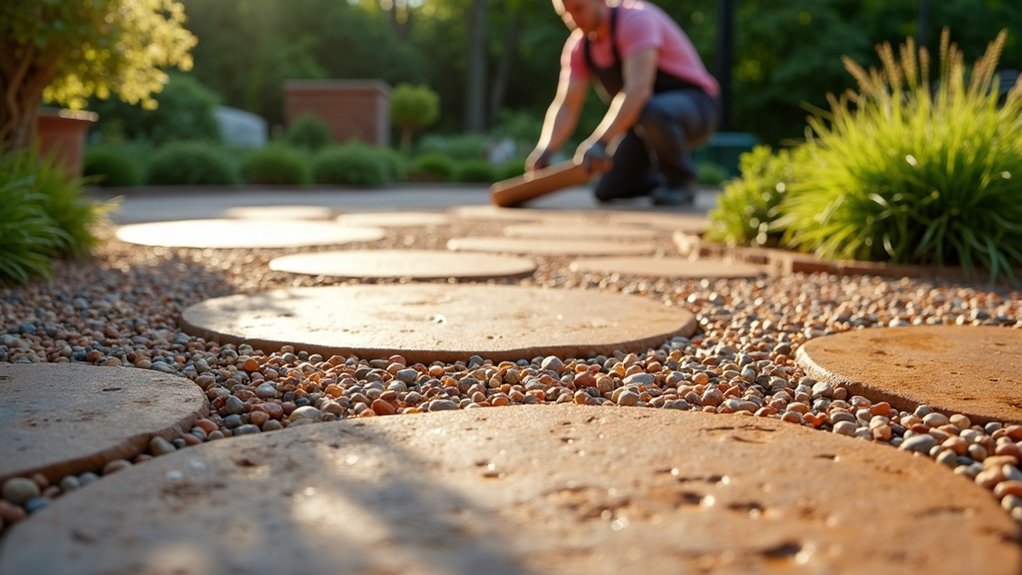Resin-bound gravel patios cost £50-£100 per m², with exact prices varying by materials and project scale. Larger installations often work out cheaper per square metre. UV-stable resins and high-end stones cost more but offer better longevity. Proper ground preparation is crucial – skimp on this, and you’ll pay for it later. Think of it like laying a house foundation; get it right first time.
Key Takeaways
Resin-bound gravel patio costs vary significantly based on your project size. Larger areas over 100m² work out cheaper at £50-55 per square metre, whilst smaller spaces under 20m² cost between £65-100 per square metre.
Opting for quality materials like UV-resistant resin and top-grade stones will bump up your initial costs, but they’ll last far longer than basic alternatives.
Your location plays a big part in labour costs – London and the South East typically charge more than other UK regions. Skilled fitters command higher rates, especially for intricate patterns or unusual shapes.
If you’re planning a complex design with curves or multiple colours, expect to pay more. These projects need extra materials and take longer to complete properly.
The good news? Once installed, maintenance costs are minimal. You won’t need to repair or replace your patio often, making it a smart investment that should last about 20 years.
Understanding Resin-Bound Gravel Patios
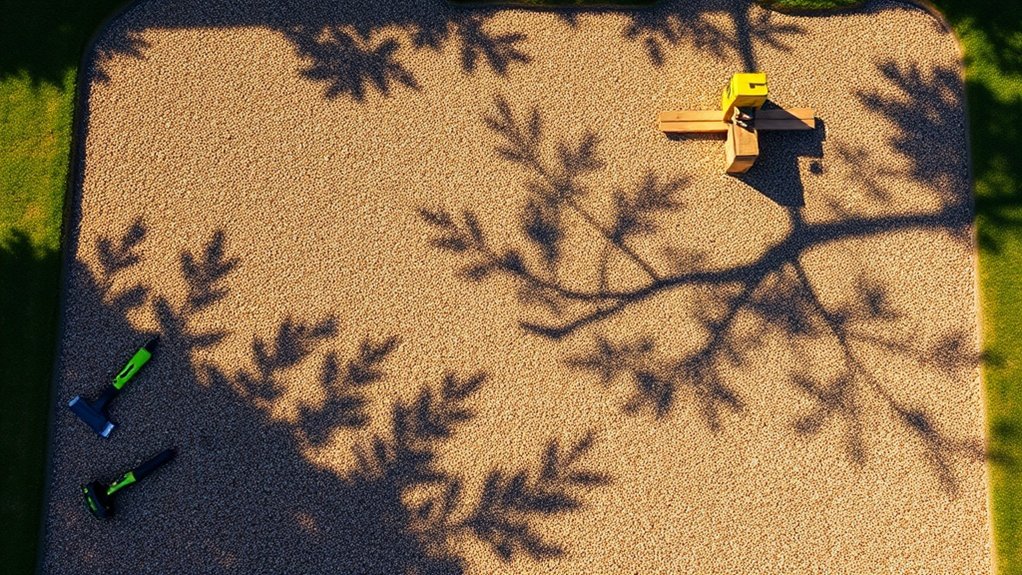
Resin-bound gravel patios offer a practical and attractive solution for British gardens. The system combines natural stones and aggregates with UV-resistant resin to create a smooth, even surface – much like traditional gravel but without the loose stones.
You can select from various colours and stone types, from local Cotswold limestone to Welsh slate, to complement your garden’s style. The aesthetic appeal and customization options of resin-bound gravel allow homeowners to tailor their patios to their unique tastes.
These patios excel in our British weather, as their permeable surface allows rainwater to drain naturally, reducing puddles and helping prevent localised flooding. Think of it as a giant sponge for your garden. This feature contributes to sustainable drainage solutions by effectively managing stormwater. Unlike block paving or concrete, there’s no need for additional drainage systems.
Built to last, a properly installed resin-bound patio should serve you well for 20+ years with minimal upkeep – just an occasional sweep and power wash keeps it looking fresh. The exceptional durability of resin-bound surfaces ensures that they maintain their functionality and appearance, making them an attractive investment.
Whilst the initial cost might be higher than traditional paving, its longevity and low maintenance make it a sound investment for UK homes.
Cost Breakdown per Square Metre
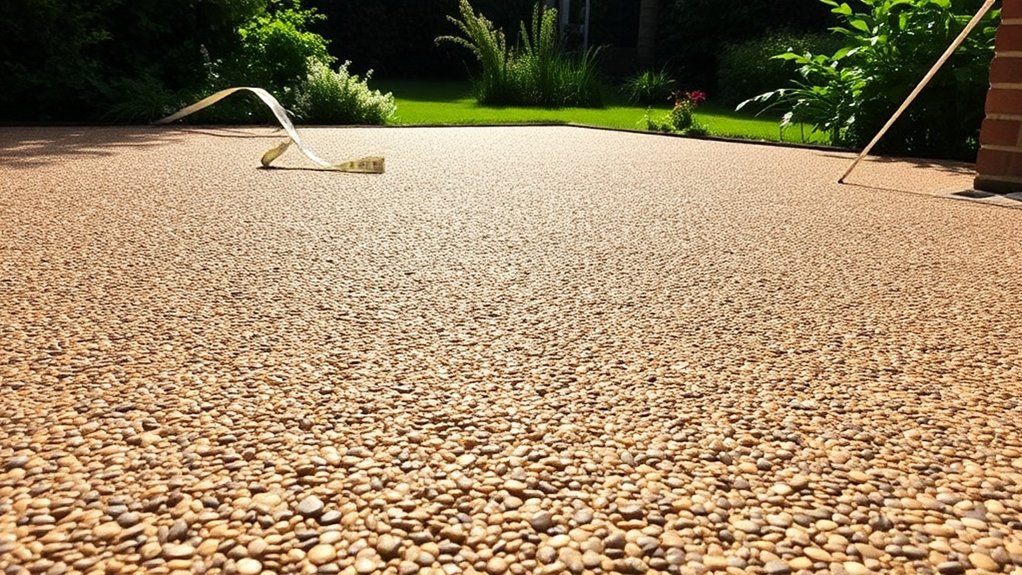
Cost Breakdown: Resin-Bound Gravel Patios
The price of resin-bound gravel patios varies significantly per square metre:
- Size Impact
- Large areas (100+ m²): £50-55/m²
- Small areas (under 20 m²): £65-100/m²
- Material Quality
- Standard aggregates and resin: Basic rate
- UV-stable resins and premium stones: Higher costs
- Design Complexity
- Straight edges and flat surfaces: Standard rate
- Curves, patterns and slopes: Additional labour costs
The final cost depends heavily on your choices. Additionally, proper drainage and soil compaction are vital for stability and can influence overall project costs. A simple 40 m² rectangular patio will cost far less than an intricate design with curved edges and premium materials. If the ground preparation is inadequate, it may lead to higher costs due to increased drainage needs.
Preparation and Groundwork Requirements
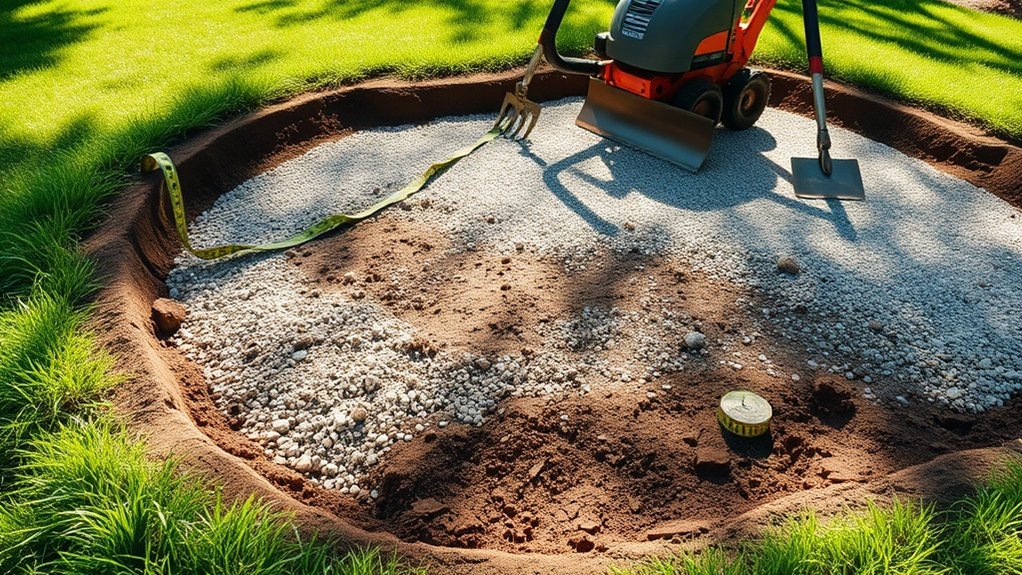
Essential groundwork for resin-bound gravel patios starts with proper site excavation. Dig to the correct depth to accommodate both sub-base and surface layers, removing all debris and plant matter for a stable foundation. Sort your drainage first – install channels or soakaways to prevent water pooling, which is particularly crucial in British weather. Additionally, a well-laid foundation ensures adequate drainage, so lay a weed-proof membrane, followed by MOT Type 1 aggregate sub-base, thoroughly compacted. Check it’s dead level with a spirit level – any dips or bumps will show through your finished surface. Finally, fit proper edging to contain the area, much like you’d edge a traditional garden path. These steps might seem like a faff, but they’re vital for a long-lasting job. Additionally, using a permeable sub-base will enhance water drainage and prevent surface issues over time.
Labour and Installation Process
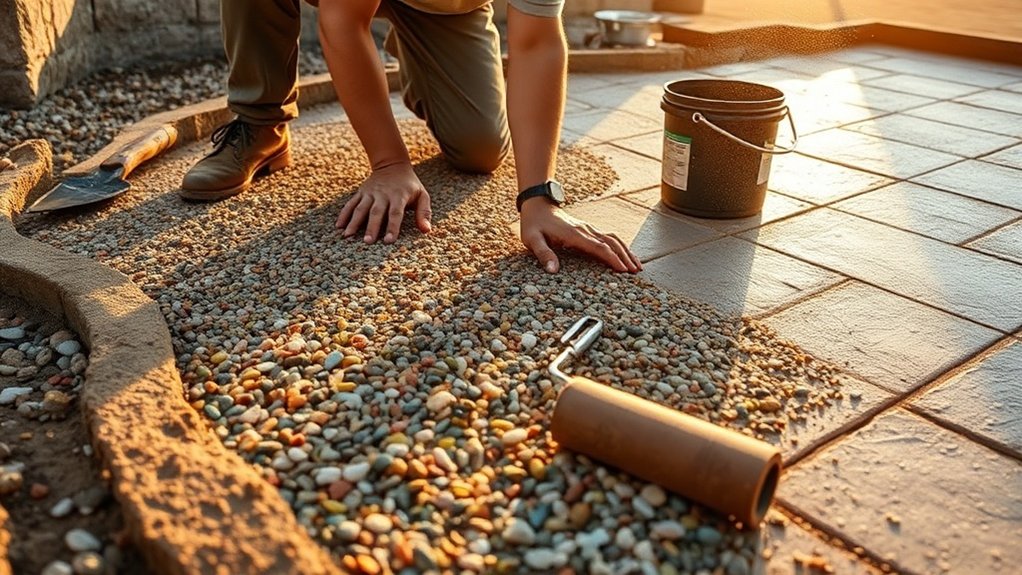
Labour and Installation Process
Installing a resin-bound gravel patio requires precise attention to detail and expert craftsmanship. Key considerations include:
- Skilled Labour: Professional installers with proven experience ensure proper application and lasting results.
- Time Management: The resin mixture begins to set within 10-15 minutes, requiring swift, organised work.
- Ground Preparation: A properly primed base is crucial for strong adhesion.
Labour costs vary depending on your location and the contractor’s expertise.
The process demands specific tools and techniques for mixing and laying the material.
Like any quality paving job, thorough preparation and skilled workmanship make the difference between an average and exceptional finish.
Material Choices and Their Impact on Cost
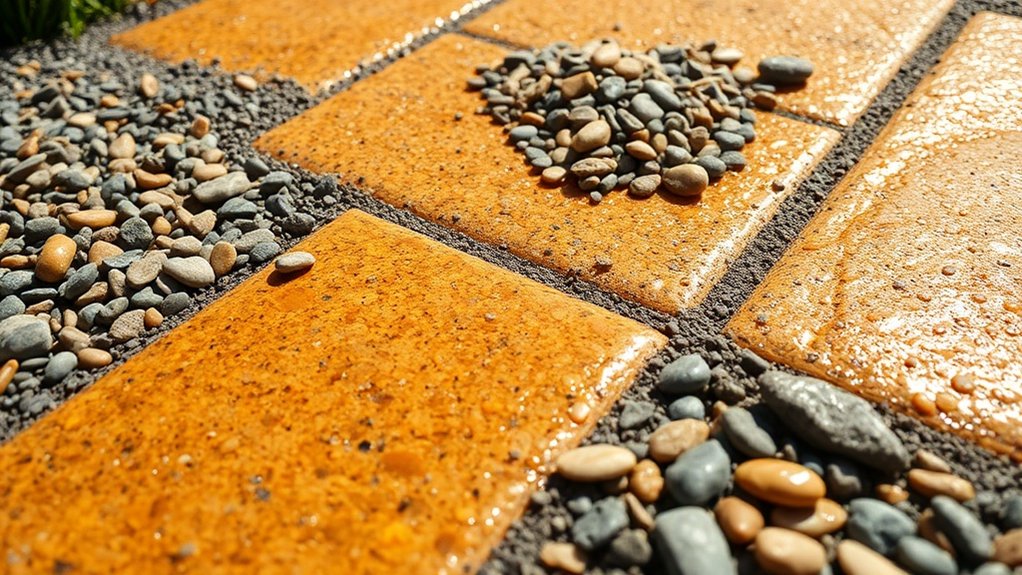
Material Costs: What You Need to Know
The materials you choose for your resin-bound driveway or patio significantly affect your overall costs. Premium UV-stable resins and high-grade aggregates, whilst pricier, offer better longevity and a more polished finish.
For instance, using crushed granite or marble chips creates a luxurious look but costs roughly £10-15 more per square metre than standard aggregates.
Budget-friendly options like basic stone chippings can cut initial expenses by up to 30%, but often need repairs or refreshing within 5-7 years.
The key is striking the right balance – mid-range materials typically offer good value, combining reasonable durability with manageable costs.
A practical tip: mixing premium aggregates with standard ones can create an attractive finish whilst keeping costs down.
Aggregate Type Influence
Aggregate Type Influence
Your choice of aggregate for a resin-bound gravel patio significantly affects the overall cost of your project.
Three key cost factors to consider:
- Aggregate Sourcing: Local quarry materials reduce transport costs, whilst imported stones like Italian marble command premium prices.
- Aesthetic Preferences: Standard stones like Cotswold keep costs down, but speciality aggregates such as rose quartz increase expenses.
- Size and Shape: Larger stones (6-10mm) typically need less resin than smaller ones (1-3mm), though they’re often dearer to purchase.
The aggregate you select influences both immediate costs and long-term value, affecting wear resistance and maintenance needs.
Consider your budget and practical requirements when weighing up options.
Resin Quality Variations
Choosing the right resin for your patio directly affects your project’s bottom line. Quality variations between resin grades determine how well your surface will hold up over time.
UV-stable polyurethane costs more upfront but maintains its colour and resists fading far better than cheaper alternatives. Lower-quality resins might save money initially but often deteriorate quickly, leaving you with unsightly patches and costly repairs.
For busy areas, high-grade aliphatic resins offer excellent scratch resistance – think of areas where garden furniture gets moved about frequently.
Whilst premium resins might stretch your budget at first, they’re typically more cost-effective long-term, requiring less maintenance and fewer repairs.
Influence of Project Size and Layout
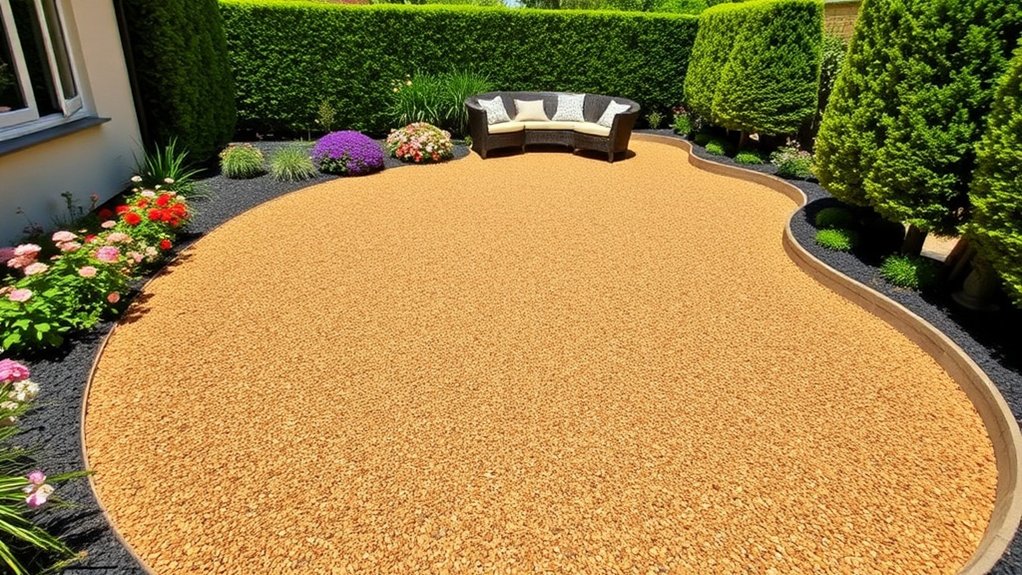
Project dimensions and design complexity significantly impact resin-bound gravel costs.
Larger patios tend to cost less per square metre due to bulk material savings, whilst detailed patterns or irregular shapes require extra labour and materials.
A simple rectangular patio of 30 square metres would cost considerably less per unit than a 15-square-metre space with curved edges and multiple levels.
The layout you choose directly affects both your budget and installation timeline.
Economies of Scale
Bigger Resin Driveways Make Better Financial Sense
A small resin-bound gravel project might seem sensible, but scaling up brings substantial savings and superior results:
- Bulk Buy Benefits: Order 50 square metres rather than 15, and suppliers often slash prices by 20-30%.
- Better Value Labour: The time spent mixing materials and setting up serves more surface area, bringing down costs per square metre.
- Less Material Waste: Larger areas mean smoother coverage and fewer awkward offcuts, making the most of your materials.
Most UK driveway specialists offer better rates for bigger jobs, typically working out £10-15 cheaper per square metre on larger projects.
Layout Complexity Impact
Complex layouts on resin-bound gravel patios significantly affect costs and materials needed.
Fancy designs with curves and odd shapes typically waste 5-10% more material than simple layouts. You’ll also need skilled fitters for tricky patterns, which costs more in labour.
Getting the groundwork right is crucial – proper drainage and levelling become trickier with complex designs.
If you’re after special patterns or want different coloured zones, your installer will need extra time to mix aggregates properly.
For the best value, try to strike a balance between eye-catching design and practical simplicity.
A straightforward layout with one or two features often works better than an overly elaborate design, both for your budget and long-term maintenance.
Additional Cost Considerations
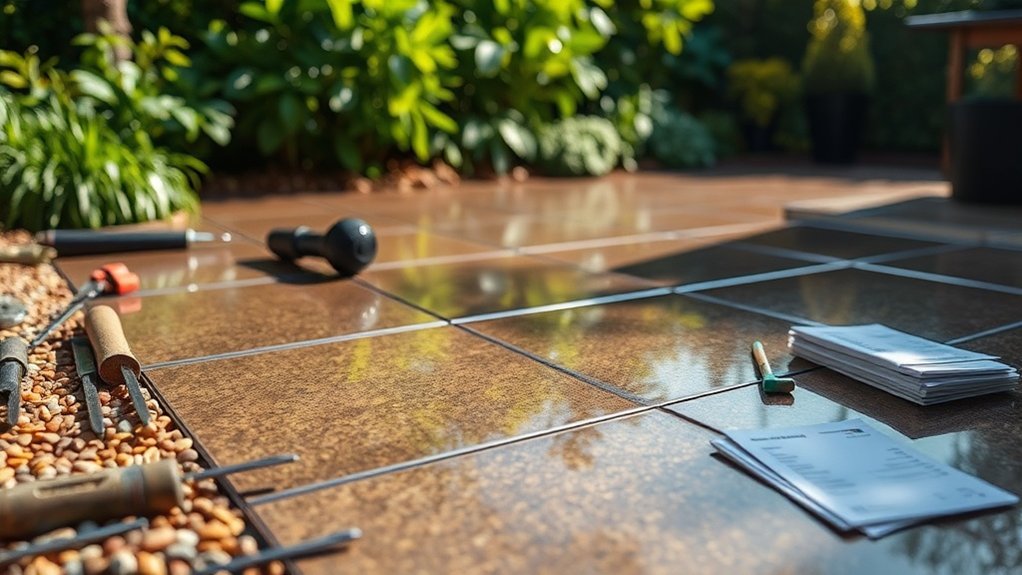
Additional Cost Considerations for Resin-Bound Driveways
Planning a resin-bound surface requires careful consideration of extra costs beyond basic materials and fitting:
- Ground Preparation: Expect higher costs if you need to remove old concrete or repair damaged sub-base – typical for UK properties with existing patios or uneven ground.
- Labour Costs: Access through narrow side passages or working around established gardens can increase work time and labour charges.
- Design Elements: Practical additions like drainage channels or border details boost both function and style but add to the final bill.
Factor these costs into your budget from the start to avoid unwelcome surprises.
A standard 40m² driveway project can easily increase by £500-£1,000 when including these elements.
Long-Term Value and Maintenance of Resin-Bound Patios
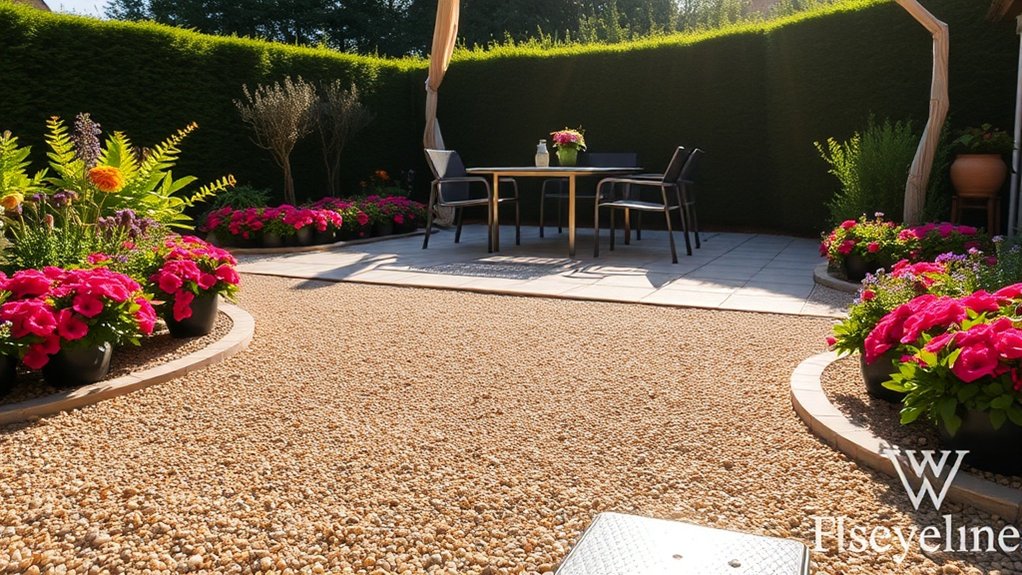
A resin-bound patio is a sound investment for your outdoor space, offering exceptional durability in Britain’s varied weather conditions.
These surfaces withstand daily foot traffic whilst resisting common issues like staining and weed growth.
To maintain your patio, simply sweep regularly and hose down as needed – much like you’d with a standard garden path.
This basic care helps preserve the surface quality and weather resistance, keeping it looking smart throughout the seasons.
The minimal upkeep needed means fewer maintenance costs over time compared to traditional paving.
Quick removal of fallen leaves and debris prevents weed growth, a particular concern during British autumns and winters.
With proper care, your resin-bound patio will serve as a practical, attractive garden feature for many years, handling everything from summer barbecues to winter frost.
Frequently Asked Questions
How Long Does a Resin-Bound Patio Typically Last?
A properly maintained resin-bound patio lasts between 15-25 years in British weather conditions. Regular cleaning and resealing every 2-3 years (similar to treating a wooden deck) helps maintain its appearance and structural integrity. Think of it as a long-term investment, much like a quality garden patio set.
Can I Install a Resin-Bound Patio Myself?
Whilst resin-bound patio installation is possible as a DIY project, it’s not a task to undertake lightly. You’ll need specific tools, precise measurements and proper understanding of mixing ratios. Much like laying concrete, timing is crucial – once the resin starts setting, there’s no going back. For best results, work on a dry day with temperatures between 5-30°C, typical of British weather from late spring to early autumn. Consider practising first with a small area, such as a garden path, before tackling a full patio.
What Weather Conditions Affect Installation?
Weather significantly affects installation success. The temperature must stay between 5°C and 25°C, and the surface must be dry. Too much rain or extreme temperatures will harm your resin-bound patio’s durability and looks – much like trying to lay cement in the rain, it simply won’t set properly.
Are There Eco-Friendly Resin Options Available?
Yes, eco-friendly resins are available in the UK market. Several manufacturers offer sustainable options certified for environmental standards, including RecoPly, which incorporates recycled plastic materials. These alternatives provide the same durability as traditional resins whilst supporting better recycling practices and reducing environmental impact.
How Can I Enhance the Appearance of My Patio?
Spruce up your patio with decorative stones to add texture and visual interest. Install outdoor lighting, such as lanterns or string lights, to create a cosy atmosphere and showcase your garden features after dark. These simple touches transform an ordinary patio into a welcoming outdoor living space for evening gatherings.
Conclusion
A resin-bound gravel patio offers a practical and attractive upgrade to any garden. While the initial investment may be substantial, the result is a durable, low-maintenance surface that adds genuine value to your property. Perfect for enjoying morning tea outdoors or hosting garden parties, these patios provide excellent drainage and remain stable throughout Britain’s varied weather conditions. The finished surface draws admiring glances from neighbours and creates a smart, contemporary look that enhances any outdoor space.
